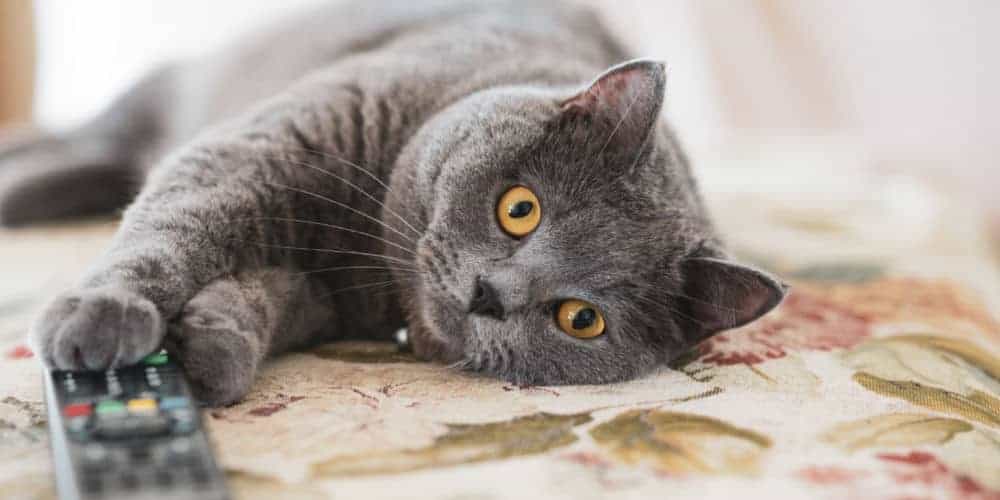Do Cats Like Watching TV?

Felines are an interesting bunch. They’re perceptive and observant creatures. They can also be extremely attentive when they want to be; like when they’re watching TV.
One day, I noticed my cat fixated on the screen and taking in what was happening. That wasn’t the case with my other cat, though, which didn’t seem interested at all. This made me start to think about how cats react when they look at a television set.
So, do cats like watching TV? Some of them do. Some even have favorite programs they like to watch. Although, their ability to process images is different from ours.
Keep reading to find out why your cat enjoys watching TV and how they’re able to process images on the screen. You might even discover which shows your cat likes to watch.
Let’s dive in.
At the same time, you must give your cat time to jump, play, and explore. It’s the best way to hone her hunting skills while maintaining her physical and mental health.
Cat Attitudes is reader-supported. When you buy through links on our site, we may earn an affiliate commission.
Why Do Cats Like Watching TV?
I don’t know if my cat understands what’s happening on the screen. What I’m sure of is that he seems to be enjoying it a great deal. Here are a few possible reasons why cats enjoy watching TV:
Lights, Camera, Action!
The colors, movement, and sounds are what keep your kitty glued to the screen. You’ll notice your cat is more attentive when there are bright colors and fast-moving objects.
They also prefer shows that feature small creatures. To your cat, it’s like they’re watching live-action through a window.
Watching TV is a form of mental stimulation. Plus, it boosts their hunting behavior. Also known as play or prey drive, this inherent behavior is a vital part of your feline’s predatory instinct.
A Sign of Affection
Another reason why your cat snuggles with you to watch TV is to show how much they love being around you. Your cat enjoys doing what you’re doing. So, if watching TV is something you like doing, they want to be a part of it.
Compared to dogs, cats may seem aloof and independent. Yet, they’re actually sweet and caring. They also adore their owners but prefer conveying their affection in their own way and on their own terms.
Experts say cats are more subtle in how they express their love for you. However, it doesn’t take away from the fact that they feel a strong bond between their owners.
Besides watching your favorite shows with you, here are some things cats do to express their affection:
- Headbutting you
- Standing between you and the computer screen
- Nibbling at your fingertips
- Giving you ‘eye kisses’ with half-closed lids and repeated slow blinks
- Meowing when they see you
Curiosity
Cats are curious creatures. Add television to the mix and their curiosity goes to a whole new level.
You’ve probably seen your kitty sniffing around the TV set or pawing at the screen. They’re trying to figure out how to get to that moving object or locate where the sounds are coming from.
For them, it’s like these things are actually in the room with them. They may even get the sense that they’re looking out of a window.
How Do Cats Process What They See and Hear on TV?
Let’s talk about how cat eyes take in what they see on the screen. It mainly depends on your cat’s ability to make out colors and depth perception. It also factors in how old your TV is.
All in all, cats are more visual than other creatures. They respond better to visual stimuli, which seems to enhance their senses and improve their cognitive functions.
Refresh Rate
A typical television set refreshes its image every 30 to 60 seconds. This refresh rate is measured in hertz, Hz.
Cats process images at a rate of 80 to 100 Hz. That’s faster than a standard television’s refresh rate. In other words, what your cat sees isn’t actual movement; it’s more like a series of still images that flicker slightly before moving on to the next one.
We don’t have that problem, even with older TVs, because our eyes only need around 20 Hz or more for smooth viewing.
On the other hand, if you have a more recent model, it may not be a problem for your cat. More advanced television sets have a faster refresh rate. So, the images transition more smoothly. Cats believe what they see on the screen is happening in real life, which is why it fascinates them.
Color and Depth
Cats can see images similar to how we see them. Although, they can’t see in technicolor like us. They can just see the basic primary colors as well as several shades and hues.
In contrast, dogs have poor color perception. This might explain why your cat likes watching TV more than your pooch.
Sound Perception
Sound is one of the main components of watching TV. You probably already know that cats have an impressive sense of hearing.
They recognize the different sounds with ease and fidelity, which is one of the main reasons they stay glued to the screen. Yet, what they have a problem with is distinguishing where the sound is coming from. It’s especially hard with the newer, high-definition, surround-sound models.
Is Watching TV Bad for Cats?
Does your cat look adorable sitting in front of the television? You probably took tons of photos to show your friends, right?
Even though it can be cute in the beginning, it’s not a good idea to leave your cat in front of the TV for hours on end. It’s important to limit their time in front of the screen to prevent health complications later on.
One way to do that, whether you’re at home or heading out, is to set a timer. Almost all televisions nowadays come with a built-in timer to control when the television powers on and off.
Timers give your cat the best of both worlds. You turn the unit on, choose their favorite channel, set the timer for an hour or two, depending on how long you’ll be away. This way, your cat gets to watch her favorite shows, as well as enjoy much-needed time away from the TV screen.
The Importance of Regular Exercise
Watching TV isn’t bad for your cat, but it’s not good for them either. Cats need exercise and mental stimulation, just like us. They’re not going to get that from watching a two-hour documentary on cheetahs.
Regular exercise improves cats’ flexibility and keeps them healthy and active. It also maintains their ideal body weight, boosts circulation, and tones their muscles.
There are many ways to get your cat to hone their natural hunting skills and keep their minds alert. Here are just a few ideas:
- Crumple up a sheet of paper and toss it back and forth with your kitty
- Wand toys made with string, feathers, or a small bell
- Fill a ball or a toy with catnip
- Drag a toy mouse on the floor, pausing now and then to mimic a typical prey
- Give your kitty a small empty cardboard box
Real vs Fiction
The other reason is that cats can’t tell the difference between real life and what’s happening on TV. So, what do you suppose your cat would do if you happened to be watching a show about birds or if a commercial about some bug spray came on?
They’ll jump up on the screen and try to attack it! The best way to avoid this disaster from happening to you is to train your cat to keep its paws off the TV at all times.
Cats are actually a lot easier to train than other animals because they’re highly intelligent. One way to keep them away from the TV is to use a spray water bottle.
Give it just a couple of quick squirts to sidetrack them and they’ll quickly walk away. Repeat it each time they come close to the TV and they’ll get the message soon enough.
Another training method is to use positive redirection. Get your cat’s favorite toy and direct their focus on the toy and away from the television.
Bright Lights
Does your cat love sitting close to the TV set? Don’t worry, it’s fairly common among cats. Apparently, that’s where all the action is and they don’t want to miss a second of it!
The problem is cats’ eyes are built to see things clearly in the dark. Being close to the TV can lead to poor eyesight. Even if their pupils contract, they’re still taking in huge amounts of bright light, which can damage their retinas.
Train your cat to sit on the couch or armchair when they’re watching TV. If she jumps back in front of the unit, use one of the training methods we mentioned above to deter her away.
Another trick you can try is to carry your cat to the couch and sit next to her. You can even stroke her gently to encourage your feline friend to stay away from the television set. Believe me, there’s nothing your cat likes more than having you rub, tickle, and stroke their fur.
What Kind of TV Shows Do Cats Like to Watch?
Does your cat seem to prefer one TV program over another? That shouldn’t come as a surprise. By now, you have a clear understanding of your cat’s distinct personality. It’s their unique quirks and interests that make them who they are.
So, what interests one cat may not be of interest to another. One theory is that some cats have a more intense drive to stalk and catch prey than others, but we can’t know for sure.
In general, cats will pay attention to the TV if large objects are moving quickly across the screen. They like the motion and excitement.
Another type of TV shows that cats can’t get enough of is nature shows, especially when they revolve around birds, fish, or small mammals. These are typically things your cat would naturally focus on if she were in the wild. So, the movements and sounds are more than likely to stimulate a strong response from your feline friend.
Final Thoughts
Now that you’re an expert on the topic of whether or not cats like to watch TV, you can enlighten all your feline-loving friends. And remember, moderation is key when it comes to allowing your cat to watch TV.
If your cat enjoys watching TV, let them watch. You can even leave the TV on when you’re away for an hour or two. If you’re heading out, turn the television on and set a timer.
